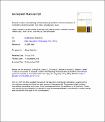Browsing Faculté des arts et des sciences – Département de psychologie - Travaux et publications by Author "Arbour, Caroline"
Now showing items 1-9 of 9
-
Are NREM sleep characteristics associated to subjective sleep complaints after mild traumatic brain injury?
Sleep after mild TBI
Arbour, Caroline; Khoury, Samar; Lavigne, Gilles; Gagnon, Katia; Gaétan, Poirier; Montplaisir, Jacques-Yves; Carrier, Julie; Gosselin, Nadia (Elsevier, 2015-04)Sleep complaints are common after mild traumatic brain injury (mTBI). While recent find-ings suggest that sleep macro-architecture is preserved in mTBI, features of non-rapid eye movement(NREM) sleep micro-architecture including electroencephalography ... -
Brain white matter damage and its association with neuronal synchrony during sleep
Sanchez, Erlan; El-Khatib, Héjar; Arbour, Caroline; Bedetti, Christophe; Blais, Hélène; Marcotte, Karine; Baril, Andrée-Ann; Descoteaux, Maxime; Gilbert, Danielle; Carrier, Julie; Gosselin, Nadia (Oxford University Press, 2019-01-28)The restorative function of sleep partly relies on its ability to deeply synchronize cerebral networks to create large slow oscillations observable with EEG. However, whether a brain can properly synchronize and produce a restorative sleep when it ... -
Does age matter? A mixed methods study examining determinants of good recovery and resilience in young and middle-aged adults following moderate-to-severe traumatic brain injury
Recovery and resilience after TBI
Arbour, Caroline; Gosselin, Nadia; Levert, Marie‐Josée; Gauvin-Lepage, Jérôme; Michallet, Bernard; Lefebvre, Hélène (Wiley, 2017-07-05)Aim: To examine whether age contributes to functional recovery and resilience after moderate-to-severe traumatic brain injury (TBI). Background: The ability to recover from TBI may change across the lifespan, but the influence of age on TBI outcome ... -
Parallel recovery of consciousness and sleep in acute traumatic brain injury
Duclos, Catherine; Dumont, Marie; Arbour, Caroline; Paquet, Jean; Blais, Hélène; Menon, David K.; De Beaumont, Louis; Bernard, Francis; Gosselin, Nadia (American Academy of Neurology, 2017)Objective: To investigate whether the progressive recuperation of consciousness was associated with the reconsolidation of sleep and wake states in hospitalized patients with acute traumatic brain injury (TBI). Methods: This study comprised 30 ... -
Regional cerebral blood flow during wakeful rest in older subjects with mild to severe obstructive sleep apnea
Cerebral perfusion in OSA
Baril, Andrée-Ann; Gagnon, Katia; Arbour, Caroline; Soucy, Jean-Paul; Montplaisir, Jacques-Yves; Gagnon, Jean-François; Gosselin, Nadia (Oxford University Press, 2015)Objectives: To evaluate changes in regional cerebral blood flow (rCBF) during wakeful rest in older subjects with mild to severe obstructive sleep apnea (OSA) and healthy controls, and to identify markers of OSA severity that predict altered ... -
Sleep and wake disturbances following traumatic brain injury
Duclos, Catherine; Dumont, Marie; Wiseman-Hakes, Catherine; Arbour, Caroline; Mongrain, Valérie; Gaudreault, Pierre-Olivier; Khoury, Samar; Lavigne, Gilles; Desautels, Alex; Gosselin, Nadia (Elsevier, 2014-10)Traumatic brain injury (TBI) is a major health concern in industrialised countries. Sleep and wake disturbances are among the most persistent and disabling sequelae after TBI. Yet, despite the widespread complaints of post-TBI sleep and wake disturbances, ... -
Sleep spindles are resilient to extensive white matter deterioration
Sanchez, Erlan; Arbour, Caroline; El-Khatib, Héjar; Marcotte, Karine; Blais, Hélène; Baril, Andrée-Ann; Bedetti, Christophe; Descoteaux, Maxime; Lina, Jean-Marc; Gilbert, Danielle; Carrier, Julie; Gosselin, Nadia (Oxford University Press, 2020-06-13)Sleep spindles are an essential part of non-rapid eye movement sleep, notably involved in sleep consolidation, cognition, learning and memory. These oscillatory waves depend on an interaction loop between the thalamus and the cortex, which relies on ... -
Towards a better understanding of increased sleep duration in the chronic phase of moderate to severe traumatic brain injury : an actigraphy study
El-Khatib, Héjar; Arbour, Caroline; Sanchez, Erlan; Dumont, Marie; Duclos, Catherine; Blais, Hélène; Carrier, Julie; Gosselin, Nadia (Elsevier, 2018-11-28)Introduction Most adults with moderate to severe traumatic brain injury (TBI) report persistent sleep-wake disturbances. Whether these complaints are either associated with abnormal sleep-wake patterns or can be explained by TBI-related characteristics ... -
Visual fixation in the intensive care unit: a strong predictor of post-traumatic amnesia and long-term recovery after moderate-to-severe traumatic brain injury
Visual fixation in the ICU
Arbour, Caroline; Baril, Andrée-Ann; Westwick, Harrison J.; Potvin, Marie-Julie; Gilbert, Danielle; Giguère, Jean-François; Lavigne, Gilles; Desautels, Alex; Bernard, Francis; Laureys, Steven; Gosselin, Nadia (Lippincott, Williams & Wilkins, 2016-12-01)Objective: We examined whether visual fixation at 24h of intensive care unit (ICU) admission is superior to the initial Glasgow Coma Scale (GCS) score to predict PTA duration and long-term TBI recovery. Design: Two-phase cohort study. Setting: Level I ...








